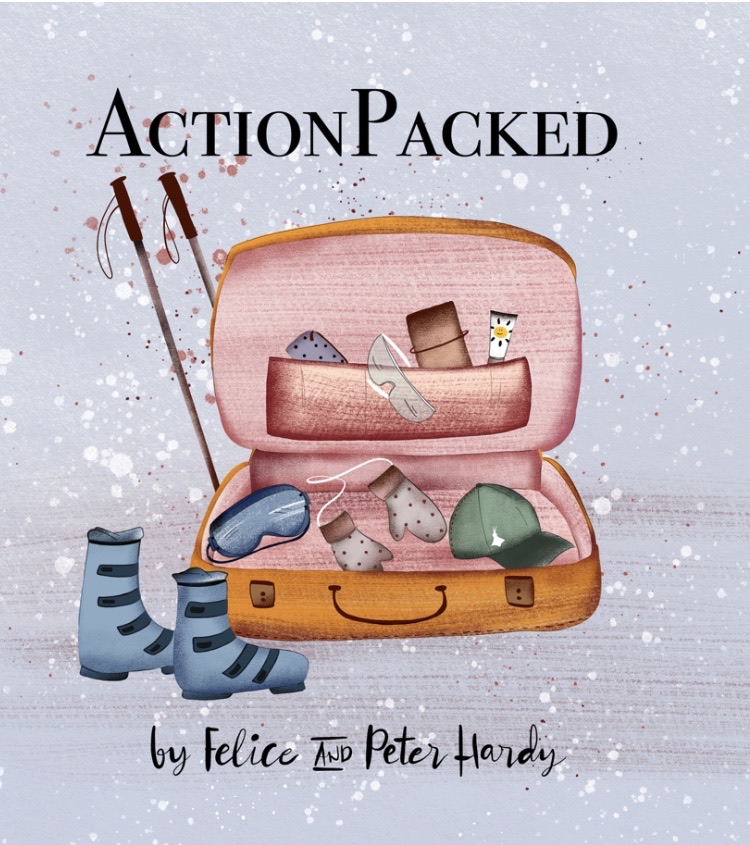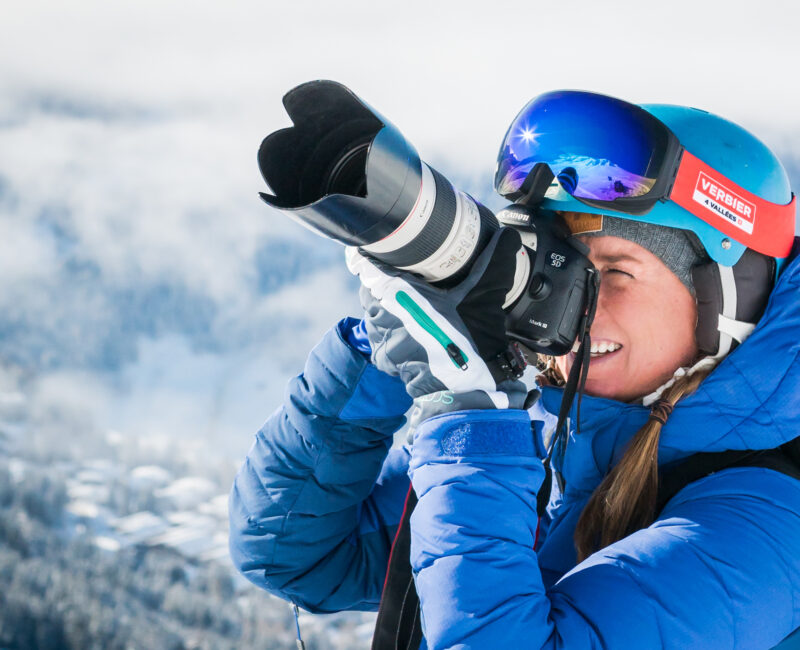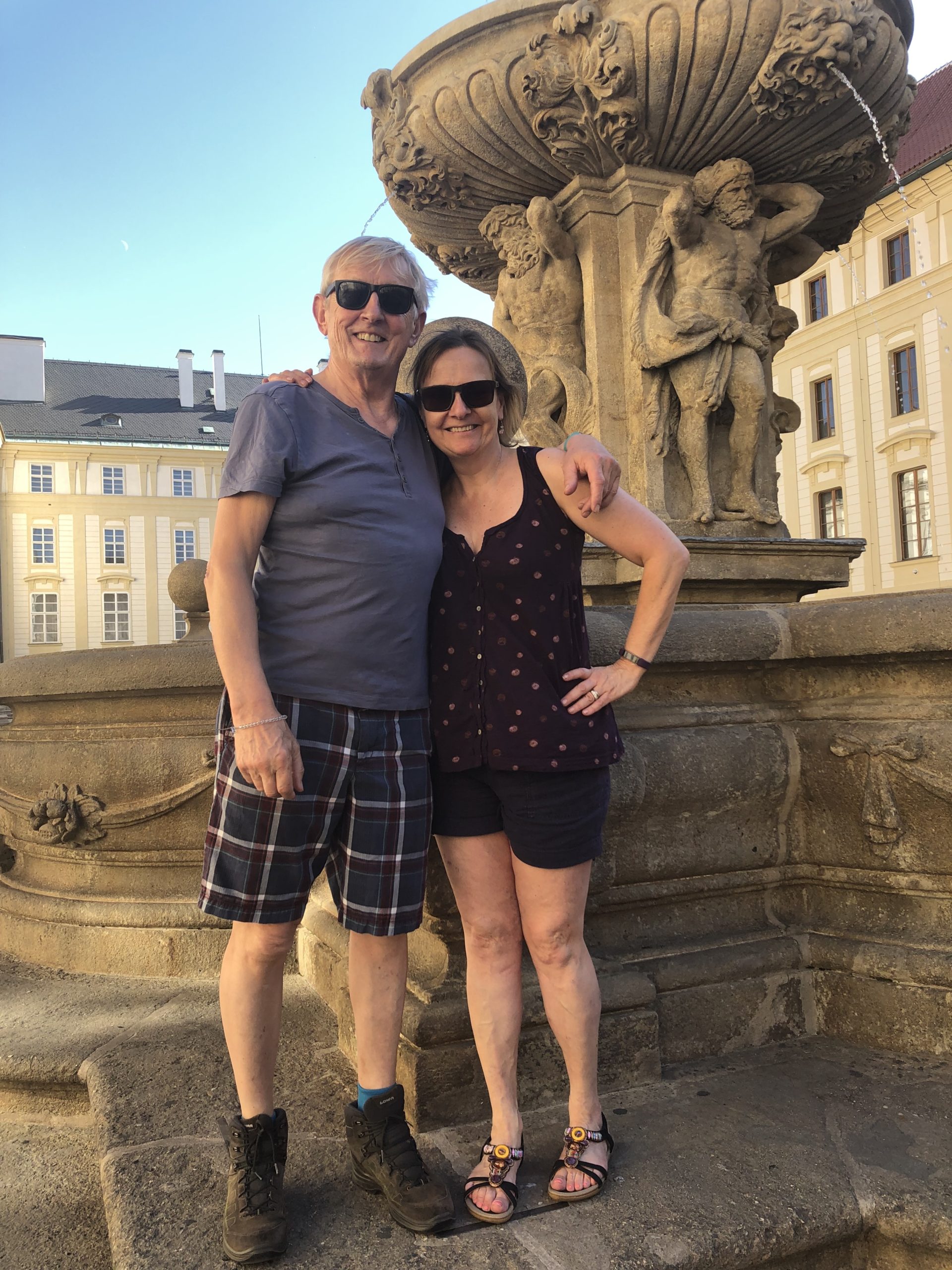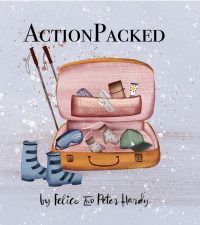
Melody in the Maldives
Peter Welcome to our travel podcast. We’re specialist travel writers, and we’ve spent half a lifetime exploring every corner of the world.
Felice So we want to share with you some of our extraordinary experiences and the amazing people we’ve met along the way.
Peter So Melody Sky, thank you very much for coming on the show today.
Melody Thank you for inviting me.
Peter Action woman extraordinary – mountain and ocean photographer, skier and free-diver. Now we’ve known you, Melody, for at least 20 years…probably rather more…and we’ve watched you, admired you living life on the edge – and I mean truly on the edge. So how did you get to the edge in the first place? Which came first, the ocean or the mountain?
Melody The ocean definitely came first. I never skied as a child; I’m from Scotland, but never skied as a child. I spent until 11 years old in Cornwall…so I was a beach girl from the very beginning.
Peter But your parents, I think I’m right in saying, were a bit of free spirits, weren’t they?
Melody Oh, yes, proper free spirits, proper hippies. Hence the name Melody Sky. Yes, they really did the whole ’60s, ’70s scene quite well. I was a mistake made in their happy days.
Peter And then you ended up in Scotland?
Melody Yes, well, actually, we were in Cornwall. My dad was working on the oil rigs so we were in Cornwall. He was doing two weeks on, two weeks off at the time, and his sports were surfing and skateboarding, so Cornwall was the ideal place. And then we finally moved back to Scotland, simply because back then education and the medical system wasn’t that great in Cornwall and my parents had a bit of worry about how we were going to grow up. So we moved back to Scotland and now they really regret being in Scotland. They love Scotland, but it’s just the weather is just horrendous…but Scotland is a great place.
Peter It all started with swimming. I think swimming was your first love?
Melody Yes, swimming. I used to compete in swimming from a very young age. And actually I still swim now; I love swimming, I love the water. I always say I’ll probably retire at the sea and retire by the ocean and get all the crazy stuff out of my system now when I can and then go back to the ocean when I’m slightly older, like next year.
Felice But you ended up living near the ocean to start with, didn’t you?
Melody Yes, I was very lucky in that I didn’t get accepted into university the first time I applied, because I applied to two. Not many people know this, but I applied to do fashion design. I think you knew that Felice maybe. I was going to do fashion design and art and didn’t get accepted to university, and so I took off to do a season in Cyprus straight from school, and just by chance ended up doing a PADI dive course and from there ended up working in a dive school as their underwater photographer. So it wasn’t supposed to be that way, but that’s what started it all.
Peter How did you get into diving?
Melody I think I’ve always been interested in the water. I love the water and whenever there’s water, a river, the sea, I’m in it. I don’t like sunbathing on the beach, I just like being in the ocean.
When I went to Cyprus to do my first season, I was actually working as a lifeguard for a rooftop swimming-pool in a hotel by day. By night I was working as a glass collector illegally in a nightclub. During the day, I think it was once a week, we used to have this diver who’s a very good friend of mine to this day – he is a skier as well – who used to come and do pool demos. So I used to jump in the pool with him on Thursdays or whenever it was and try out the scuba equipment.
I ended up doing a PADI dive course with him, a five-day open-water dive course. Then just by chance, the boss of the dive school was loading his camera in a really ridiculous way. So I said to him, ‘Would you like me to show you how to do that in an easier way?’ He was really unhappy with me. It was like, ‘You come here, you do a five-day course and you think you know it all.’ I’m not going to say what he said to me exactly, but he threw the camera at me and told me to go underwater and take the photos of the 12 clients who were going on a dive and see how easy it was.
He expected me to produce a horrible photos, but then I went underwater…he came underwater with me. I took the photos, then he took the camera off me. That night he had them developed.
The next day when I went into the school, he just looked at me and said, ‘So what are your plans for the rest of the summer?’ So that was it. He didn’t have a job, he didn’t have an opening, he didn’t have any money to give me. He said if I wanted to take photos at the school, it would save him having to go in the water on every dive and I could earn commission on the photographs that I sold, and he’d put me through all my dive courses up to Dive Master.
So that’s what I did that summer and I became a professional diver and underwater photographer, which I continued for the next few years before skiing.
Peter We’ll come on to skiing in a minute, but while we’re in the water, your great passion developed into free-diving, which, for those who don’t know, is…explain what free diving is?
Melody Free-diving is without air, without going down there with scuba equipment. It’s holding your breath, breath-holding underwater.
Peter You take a deep breath and you go down and stay down for as long as you can? How long is that? How many minutes?
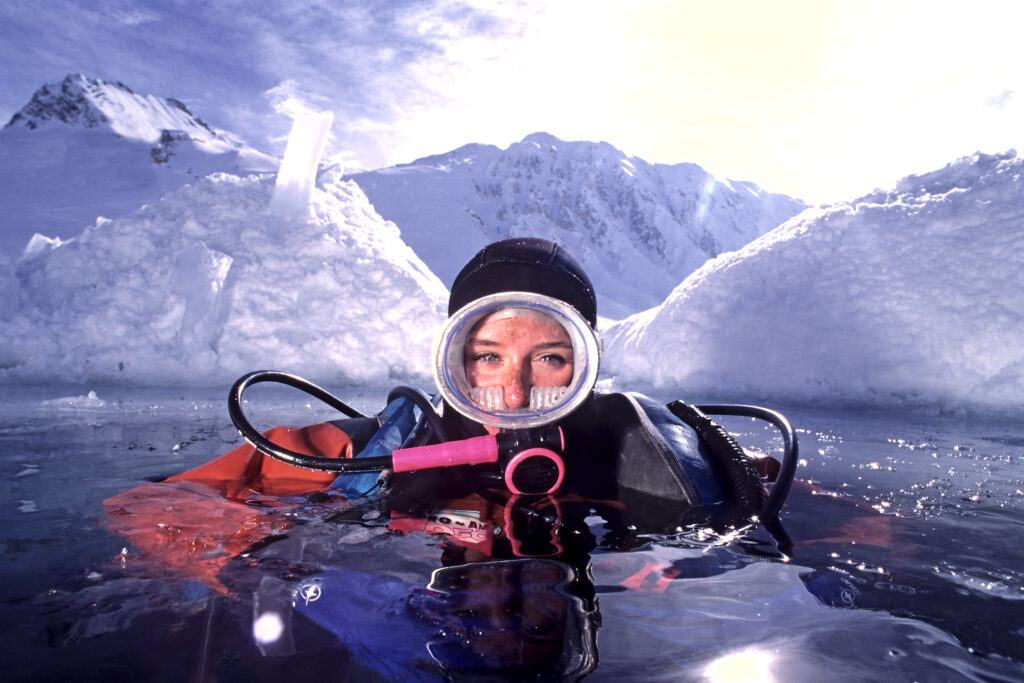
First ice dive in Tignes. Photo © Melody Sky
Melody I’m not actually that long, because I don’t spend that much time practicing. But was sort of on 3:45 or 4 minutes, but that was where the camera and I probably wouldn’t do that now. But I was training before the pandemic with a free-diver who was expecting me to get up to 6, 7 minutes.
Felice Are there any advantages to free-diving over normal diving?
Melody Well, yes. I think the fish come closer to you, or sharks or whatever, come closer to you because they don’t hear the air and the bubbles. You know, I did a project with a whale shark research program a few years back, and the other advantage there was we kept spotting whale sharks from the surface and we were able to get in the water immediately and not have to faff around putting on scuba equipment. And we’d spend time with the shark and then come back out of the water and then we’d spot another and we’re in immediately. And we didn’t have to look out for how much time we were spending breathing air. It was just a lot easier.
Peter What’s the world record for holding your breath?
Melody Oh, I should know this and I don’t know what it is at the moment.
Peter Felice, what do you think it is?
Felice I have no idea. Six minutes, maybe.
Peter Are we going over ten minutes?
Melody Oh, yes, definitely.
Peter Well, I’ve just looked it up. Where a competitor doesn’t dive but just stays submerged underwater, the longest breath hold is an incredible 11 minutes and 54 seconds – and even more so when 100% oxygen is breathed in prior to the attempt, the record is an astounding 24 minutes and 37 seconds.
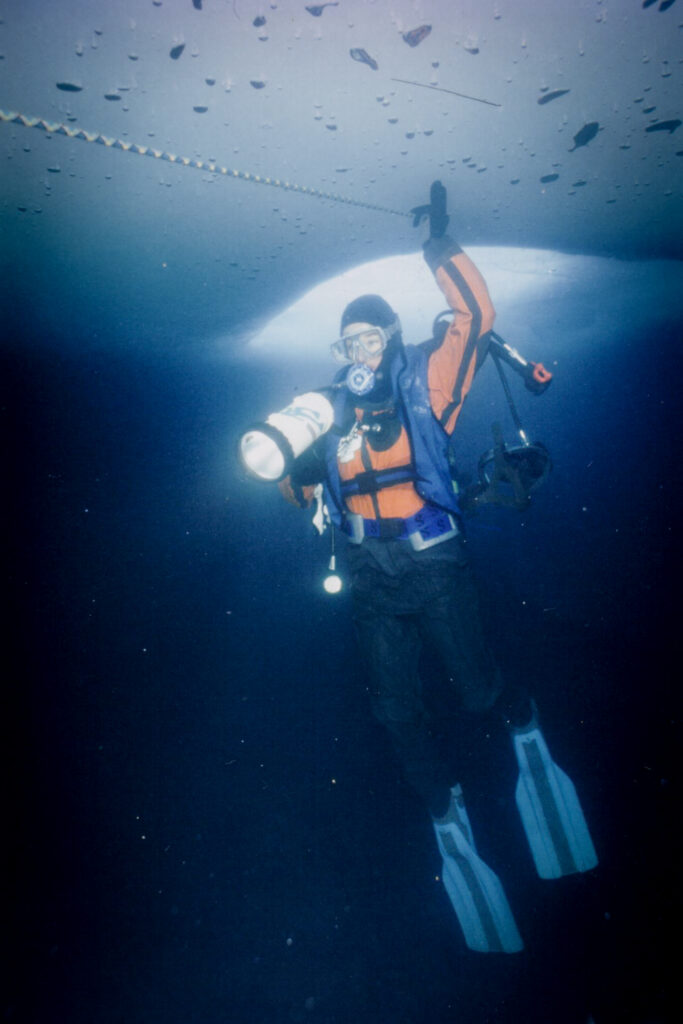
Under the ice in Tignes. © Melody Sky
Felice You must have to have really amazing lungs to be able to do that?
Melody Well, no, I don’t think so much special lungs. I’m a free-diver, but I’m not a professional free-diver so you could ask me really technical questions and I probably wouldn’t have a clue. But I love being under the water and just having that freedom under the water with the camera. So I’m not going to really deep depths, I’m just following ocean life underwater with my camera.
Peter Now, I know you’ve got to the mountains through the water, so to speak. Explain that?
Melody Oh, it was a very odd situation. I was living with a couple called JB and Claire. They’d been going to Tignes in the French Alps for nine years. She was in the French ski team and he was just a very passionate skier. They were both dive instructors, and I lived with them at the time I was in Cyprus; they were my instructors, actually. They put me through all my courses.
I went out to experience their life in Tignes. I really wasn’t interested in the cold, I wasn’t interested in skiing. They tried to convince me to go there for three years, I think it was. I said, ‘I don’t get why you people put pieces of wood on your feet and go down a mountain. I don’t get it.’ And in the cold, I’m from Scotland…I’m not interested in the cold. I still don’t like the cold, by the way.
But basically I went out to surprise them in November time and I’d never seen snow like it. It was just unbelievable. I came from Scotland where you had wet, not deep, wet snow and it was just incredible.
I went to Harry’s Bar, which is where I ended up working for a while and it turned out that they weren’t there…and I was. They’d gone off to Canada for the first time in nine years or something. A good friend of mine who owned Harry’s Bar at the time, Jeremy, said to me if I was to stay for the season, he’d give me a job in his bar. I had no intention of staying for the season.
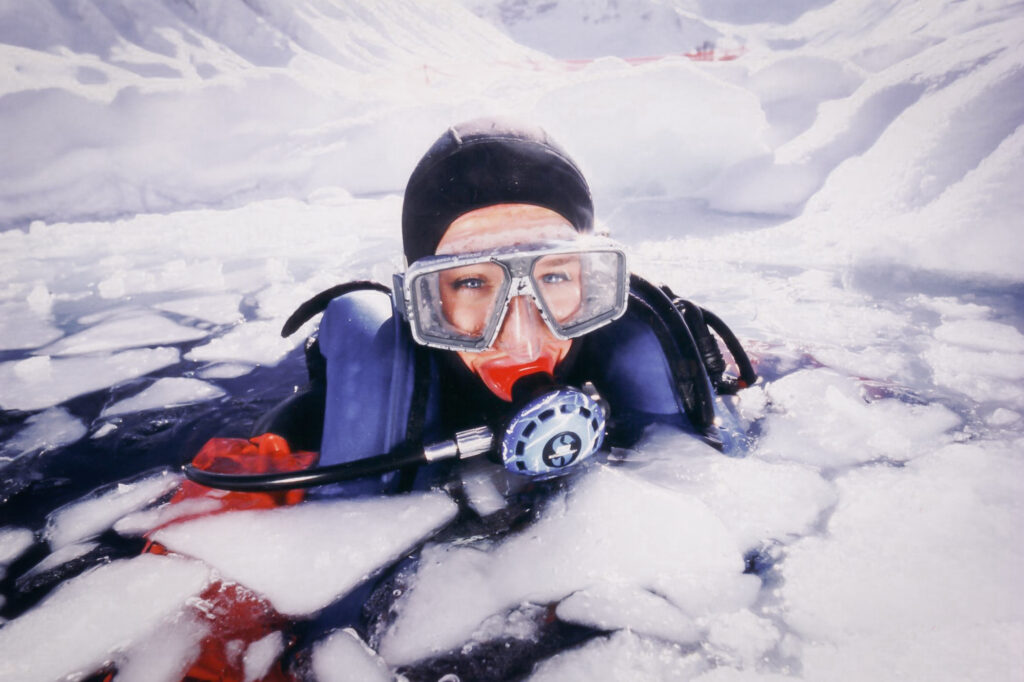
Ice diving in Tignes. Photo: © Melody Sky
But we really got on well and I lied to him and said I would stay for the season just so I got the job. But I had actually had a job as a boom girl in Vietnam with a film production crew. So I took the job in Harry’s Bar and then I got on so well with him, I couldn’t let him down so I never left. Actually, I ended up with a job teaching the ice-diving in Tignes.
So that season I went straight into scuba diving again because the ice-diving school there, they heard that there was a young girl in town who was a scuba diver. But the only problem was I was a PADI diver and the French – very much like with their ski system – they like you to follow their system.
So they said to me, if I could learn French and go through the French system or SSI, then they would give me a job. So that’s what I did. I did my dive courses all over again from the beginning and learnt French as fast as possible and ended up with a job as the ice-diver in Tignes.
Felice What is ice diving like? It always sounds quite scary to me being under the ice.
Melody Yes, everybody’s seen a horror movie where you go through the ice and you can’t find your way out. It can be a bit like that. But we were very, very safety-cautious and we used to cut three holes in sort of a triangle. I’d say it was probably 30, 40 metres apart from each other. At the beginning of the season we’d attach a line underneath to follow that triangle, so that nobody would get lost.
That was basically the route we stuck to. There were only a couple of times I had to go with a journalist, as journalists like to do things a bit more adventurous, I’d have to go off a bit further out of this loop. But when it snowed, it was really, really dark.
My first season it was a big season and the ice was at least a metre, a metre and a half thick with the snow on top. It was very, very dark. But it was really nice where the light came through the holes, it would just sort of shimmer in the water and you could just see that in the distance. Yes, it was nice.
Occasionally, if I had a client who was quite funny or seemed to want to enjoy themselves underwater and have some fun, I would inflate my dry suit, turn myself upside down and sort of walk upside down under the ice and then walk towards them, waddle towards them.
Peter Then you got out of the lake and you discovered skiing?
Melody Yes, actually the school that owned the dive centre at the time, they were also a ski school. So you know, Evolution 2, had sort of all sorts of sports going on. So I was obviously really into photography and I was a terrible, terrible ski photographer.
I used to take the odd ski photo of friends and, and then can’t remember why, but I think I watched my first ski movie there. I knew nothing about skiing and the first movie I saw was a local ski film from three local guys. I watched it and said, ‘That’s what I want to do with my life. I want to make ski movies.’
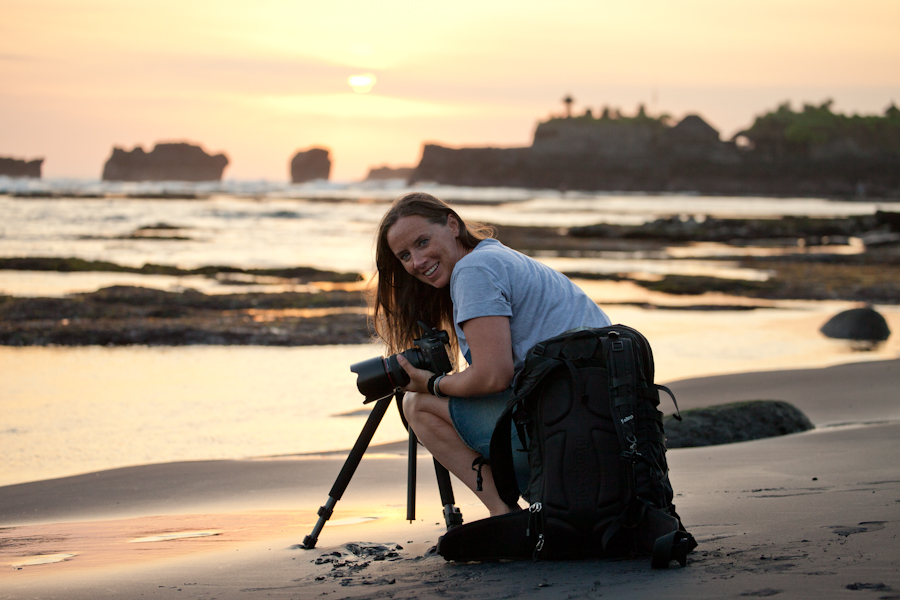
Melody on the beach in Bali. Photo: © Melody Sky
I’d never even used a film camera before, but then I did. I got myself a camera, and then Evolution 2 offered me a job filming their ski groups. So my first season’s skiing ever and I’m up there making films.
Felice When did you actually get involved in photography for the first time?
Melody Oh, I was four years old when I took my first photo, but I think I was nine years old when I got my first camera from my parents. They realised I had a passion. So every weekend my pocket money would go on developing photos. Do you remember Truprint and Triple Print? You used to get this like one photo, 6 x 4 with two small ones, in the days when we used to write letters. I used to get photos developed every weekend and then send small photos to my aunties or pen pals. So from a very young age that was what my pocket money went on.
Somebody once said to me that they think I was the first female ski film maker ever to have my films and TV shows or films shown on a cinema screen. But I don’t know, there may have been another woman before me who was out there. I’m sure there was, but can’t find any information on that. So yes, I was very young and it was many years, many, many years ago. So who knows…
Peter You’ve gone on from there to filming extreme skiing?
Melody So I actually decided when I was in Tignes and doing the ice diving and making the ski videos and so on, I sort of came to a crossroads and thought, if I want to do this professionally, maybe I have to go and study it. But then I also wanted to go to Australia at that point – 26 years old was the cut-off point for the work visa if you wanted to go and work and travel in Australia.
So basically I flipped a coin on university or Australia and I got university, and so I did it. I looked for anywhere that would do a mixed degree of film and sports science because I wanted to study both film and sport. I found a university in London that did that. So I was 26, a mature student when I started university and did a degree in film and sports science. But what was great about that was on the first year, of course, you had summer holidays and so I took the summer off and worked in a dive school as a photographer in Barbados.
And then on the second year I discovered you could do an exchange placement. So I transferred to Melbourne for the second year – and got Australia. So I went to university in Melbourne for that year. I learnt more in Australia than did in the UK, simply because it was a very practical degree in Australia – we were cutting and splicing old film and I had to act and direct and edit, and it was really being out on the field.
Australia was amazing. I managed to travel a lot as well. We had a chalet at Mount Buller, so in the winter I was skiing and in the summer I was of course at the ocean. I made a short, terrible documentary on sharks and surfers. It was a great documentary, but the editing was horrendous.
Then in the third year I went back to London and did my dissertation on the influence of mass media on the intrinsic culture of extreme sports. I basically studied freeride skiing for a year, and then the year after I ended up in Verbier making ski films.
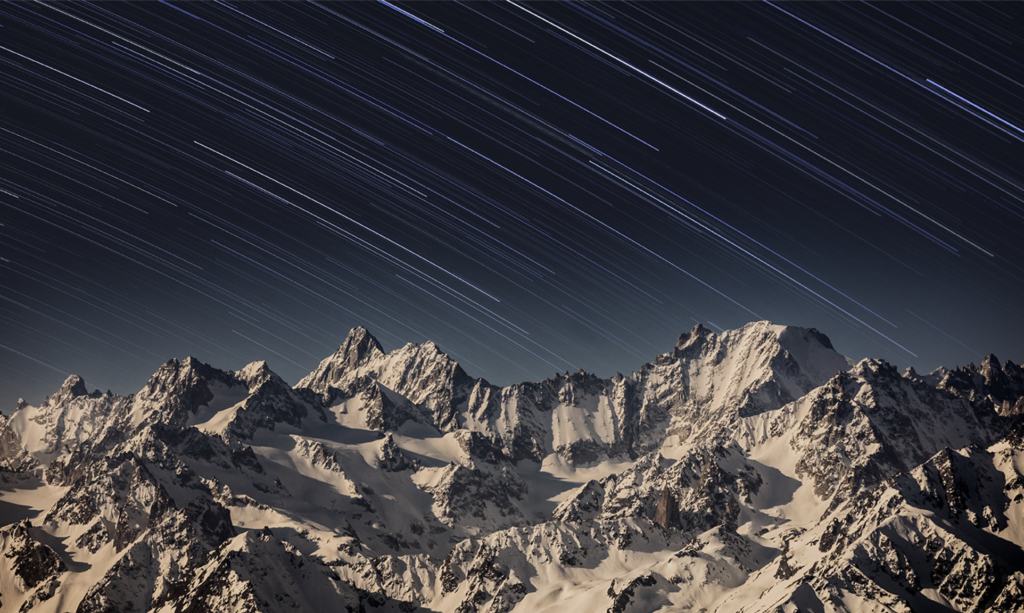
Winter Star Trails © Melody Sky
Peter Freeride skiing is very much a part of your life now. Can you explain freeride skiing for those who don’t understand?
Melody Well, freeride skiing, we’re basically out in the backcountry, skiing off the piste, you know, no piste. And we’re looking for…well, for me it’s really areas with amazing backdrops and good snow and safe conditions as well.
Until about 12 years ago, I was mostly filming, so I made quite a lot of ski movies and filming freeride events and so on. That was the majority of my work. And then I really sort of started doing more photography than filming, again. So it’s a bit like the ocean and the mountains: for a couple of years I’ll prefer one to the other and then I’ll change. And it’s the same with filming and photography. Right now I’m really deep into the photography side of things and next year I might be filming a lot again.
Peter Presumably…you’re a phenomenal skier, as you would have to be to do what you do. I’ve seen you ski and envied the way in which you ski for many, many years. But you also have to do this with a huge amount of weight on your back, too?
Melody Yes. That’s the worst thing. And I often get asked the question, would you recommend this job to anyone else? No way. It’s such hard work. I mean, I love it, but I think that’s what people don’t realise is that I have a 15, 20 kilo bag on my back and I’m having to hike to the same places as the athlete. I’m not an athlete; I’m quite lazy – I’m not that lazy, but I am a little bit lazy. But yes, it’s really physical. And you know, now I have wrist problems, elbow tendinitis, disc problems in my neck. I can see your face Felice!
Felice Carrying all that weight around, I’m not surprised.
Peter I remember once we were in Jackson Hole in Wyoming and we were off-piste in a remote area, and we knew there was a movie being made somewhere in that area. But we were climbing these ice steps that had been cut in the snow up a very steep face. I heard somebody coming up behind me and then a bit of muttering and, ‘Do you mind if I go by?’ And I said no. I got to one side and this guy came by almost at a run and he must have been carrying 30 kilos, 40 kilos of stuff and lenses and goodness knows what. He just sort of shot away into the distance; I slowly made my way up. It was phenomenal what you guys have to do.
Felice I presume, at the end of the day when everyone else gets to relax, you then have to edit. The rest of your job begins.
Melody Yes, that’s what people also don’t realise is that, you know, once I’ve done my full day on the mountain, a full work day, then you go home and have a little bit of dinner, maybe do a bit of yoga or something. But then my office hour starts…my office eight hours, you know. So I’m usually at my computer till midnight every day unless, you know, I have a dinner out or something. I’m rarely not working in the evenings. So yes, it’s a lot of work. It’s not like I have weekends off or anything like that. You never have a set pattern, you just don’t know what’s going to be around the corner. So yes, it’s busy.
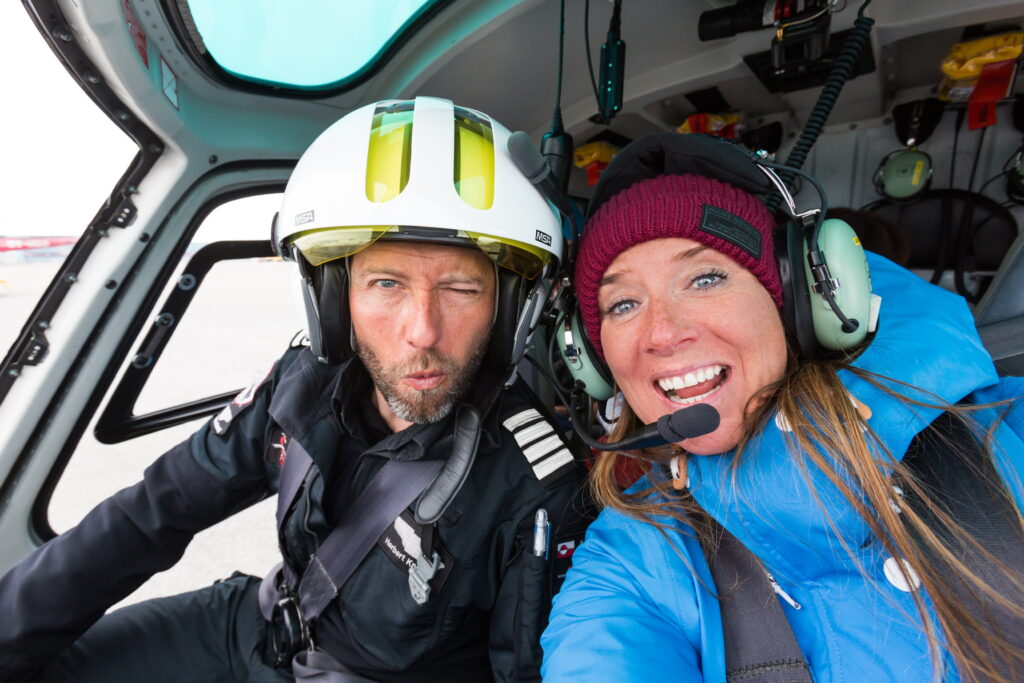
Greenland with pilot, Herb Knobloch. Photo: © Melody Sky
Felice But quite exciting because you don’t know what’s around the corner? Not boring?
Melody Yes, and it’s that variety. I love. I really, really love that. I don’t know what’s coming up next and it’s never boring. And I also like that I can plan my own life. I can take on the jobs I want to and turn down the jobs I don’t want to. And if I feel like a long lie-in, I can take a long lie-in. Even though I’ve chosen to be self-employed and work those long hours, I don’t have to get up. If I don’t have a job, I can sleep as long as I like. So there’s pros and cons to the whole thing.
Felice Have you got any ongoing projects at the moment or future projects?
Melody I just finished a really fun project and actually it’s really interesting because it’s just what we’ve been talking about. There was a production company and a brand: a production company from Norway called Process and a brand called Klätternmusen from Sweden who had the idea to make a film about photographers.
Basically they just took us to Senja, Norway, which is an incredible place, and we skied in the most incredible scenery and mountains. The film was looking at how we could be in the same location and how different our photos might turn out.
There was a Finnish photographer from Verbier actually, who is a really good friend of mine, and a Swedish photographer as well, and we didn’t have athletes with us. We were the athletes, so we were shooting each other, which was quite comical.
So then we had to ski to have shots taken of us. We had to ski with our camera bags as well, having to look elegant skiing with our big packs. Sometimes you can get away with it because you’re not in front of the camera, but we actually had to try and ski very well in front of the camera as well.
But it was great. It was really good and it was a nice project because people actually get to see in the film what we go through, where we’re actually doing the same ski tours, we’re climbing the same mountains and we’re skiing the same snow, but we have a big camera bag on our back.
Peter The pandemic and the ban on travel must have hit you pretty hard?
Melody Unfortunately, I had three amazing projects on just before the pandemic hit, and one was a movie about a free-diver who was about to break his own world record. So that’s why I was training in Egypt for a month, free-diving with him and I was about to go and, well, we’d already started this free diving movie.
And then the other one was about e-sports and health, and the other one was we were going to be climbing two peaks over 5000m in Armenia. One of the skiers, Nat Segal, she’s an Australian amazing freeride skier, and the other one was a wildfire fighter, Jess Oundjian. Yes, that’s what she does – she fights wildfires, but unfortunately, none of those projects…they all got cancelled because of the pandemic, which was quite sad.
Peter Well, I think we were all hit terribly hard work-wise by the pandemic. But for you, it just wiped it out.
Melody Yes, it was quite hard because I was working on three projects over a year. We were raising the budget and quite often when you’re working on a project like that, you don’t get paid up front. That comes maybe in the following year or when the project’s released. So, that was months, almost a year of income was just cancelled out from one day to the next, quite difficult at that time.
Felice You’ve also turned some of your photography into artwork. I’ve seen you’ve had exhibitions in the past. Actually they’re almost like paintings.
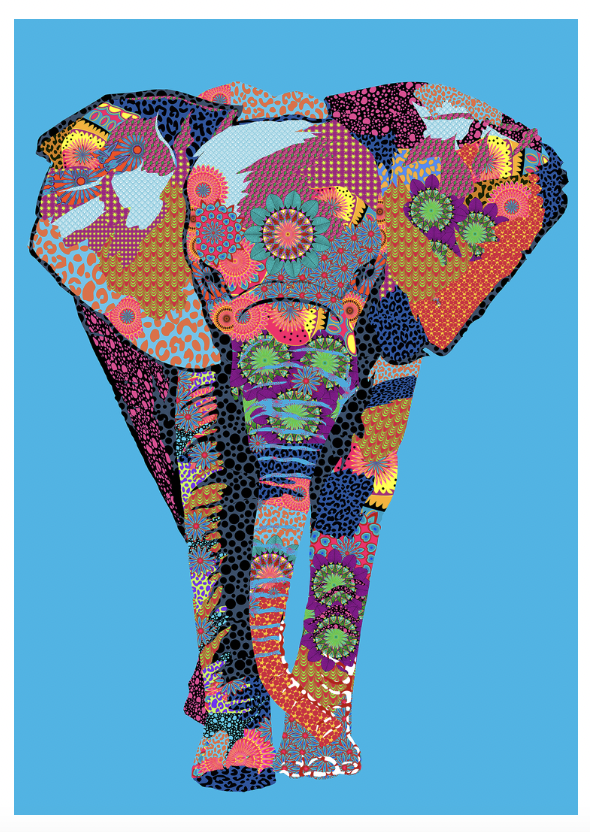
© Melody Sky
Melody Yes. I actually really enjoyed doing that. That was born out of a charity event. A friend of mine got married in Sri Lanka and her mum runs an amazing charity looking after five villages in Sri Lanka. She’s all on her own, but she brings food and medication to them. I went to visit the slums that she was working in and so on, and I couldn’t believe the work she was putting in just on her own.
So when we got back to Verbier, my friend and I – actually it was her daughter – we decided to run a fundraiser in Verbier for her charity, and had all these beautiful images from the slums, these incredible black and white photos of the people and also the elephants. We went to see lots of elephants and I then thought, ‘Oh, this is so done. I have to come up with a different idea.’
So that was when I started creating art out of my photography. So I took quite a lot of the photos of elephants. There was a mother and baby elephant, a baby elephant on its own, and an elephant side-on an elephant front-on. Then I played around with patterns. My computer turned them into graphic art and it became quite a popular product in Verbier.
Now I actually did an Alpine series as well. The W Hotel in Verbier, the W Verbier, which was voted the world’s best ski hotel….all their lifts now have my graphic art and they’ve got it in their suites as well. So probably thanks to the pandemic, I’ve started working a lot with prints and artwork and quite often people in Verbier will ask if I can maybe go and have a look at their chalet and give them an idea of what I think will work well on their walls and it’s been really nice.
Sometimes. I’ve looked at a wall and it’s been a three-metre-long wall and I’ve said, ‘Oh, ok, let’s do a Japanese scroll there with some gold leaf on it on a photo, and drop some fabric.’ And so it’s not just a photo print; I like to come up with different ideas and be a bit creative and artistic with it. So I’ve worked with a couple of interior designers now, and that’s a nice sideline.
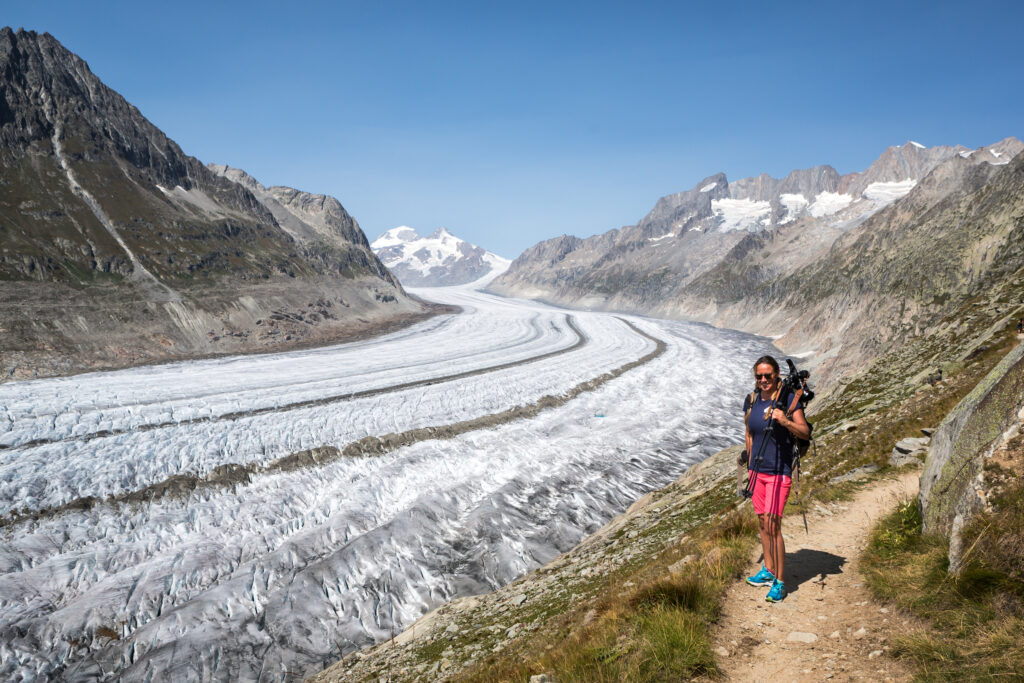
Melody on the Aletsch Glacier, Switzerland. Photo: © Melody Sky
Felice Sounds great. Thank you very much for talking to us. If people want to find out more, can you tell us what your website is called and your social media?
Melody Yes, it’s quite simple. My website is MelodySky.com and my Instagram is @MelodySkyphotography. Fairly easy to find.
Felice So people can have a look at your wonderful pictures.
Peter People buy your work online?
Melody Yes, there’s a print shop on my website as well, so people can buy work on there, but also they can contact me and I can completely customise or personalise something. Also I can produce work that’s not on the website.
Felice I think you also offer photography courses, don’t you, I saw on your website?
Melody Yes. Until now I’ve done mostly private photography courses or weekend courses, but this summer I’m actually considering doing some bigger workshops with glaciologists and astronomers also there to help educate people on the photography we’re doing – a bit deeper than the usual workshop.
Peter Because you’re fascinated by the solar system, aren’t you?
Melody Yes, I love the stars. I think I have Star Wars to blame for that. And if there’s a man with a last name Walker out there, I’m still looking for a husband with the last name Walker. So that I can be Melody Sky-Walker.
Peter On that note, we’ll say goodbye. Lovely to talk to you.
Melody Thank you so much. Bye.
That’s all for now. If you’ve enjoyed the show, please share this episode with at least one other person! Do also subscribe on Spotify, i-Tunes or any of the many podcast providers – where you can give us a rating. You can subscribe on Spotify, Apple Podcasts or any of the many podcast platforms. You can also find us on Twitter, Facebook and Instagram. We’d love you to sign up for our regular emails to [email protected]. Until next week, stay safe.
For more on Verbier, read about Geraldine Fasnacht: On a Wing and a Prayer.
© Action Packed Travel

- Join over a hundred thousand podcasters already using Buzzsprout to get their message out to the world.
- Following the link lets Buzzsprout know we sent you, gets you a $20 Amazon gift card if you sign up for a paid plan, and helps support our show.
